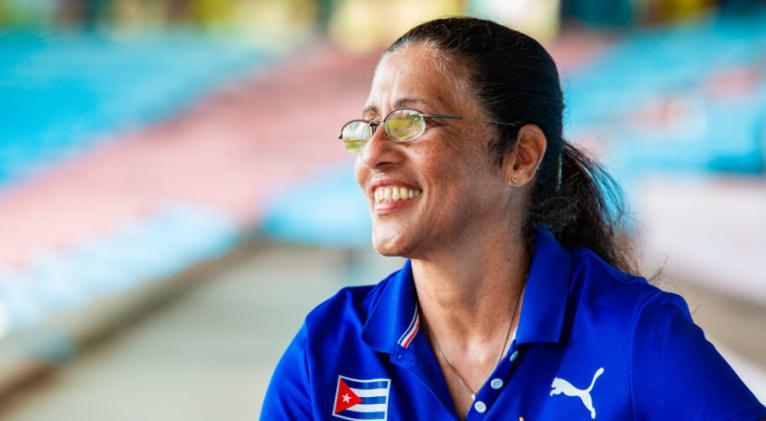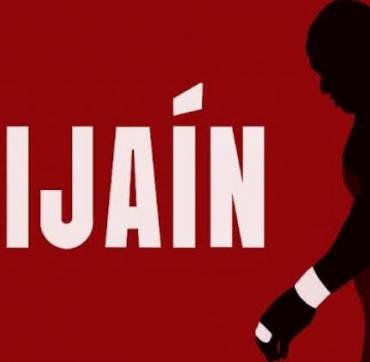If it weren't for the wizard who fell from the sky
especiales

I wanted to title a writing about her like this: The golden doors do not resist the courage of María Caridad Colón Ruenes. But I decided to use with variants The Magician Who Fell from the Sky, due to an interview conducted by my friend and colleague Hedelberto López Blanch, head of the text and the work where it is located, when the writer was conquered by that phrase that emerged from the heart of the athlete to refer to Doctor Rodrigo Álvarez Cambras. But now let's continue our Olympic journey. Switzerland awaits us in 1980 closely linked to the javelinist and the doctor.
The Moscow-based Games are close. We arrive at the Swiss stadium in the middle of a competition that serves as a warm-up for the XXII classic. María Caridad is going to throw… She is falling, oh my gosh, she has fallen…! The poor track conditions have played a trick on her. She sits up helped. She limps. They support her march to the medical center. Within 20 days, she will have to fight with javelins. She confesses that several parts of her body hurt like hell. What if she has suffered from her spinal condition? As soon as she arrives in the Soviet capital she will allow herself to be treated by Cuban doctors. “Only for them,” she warns as the pain and anguish grow.
In the USSR, she is using crutches. Let's go by her side. The pain increased when sitting and lying down. Doctor Álvarez Cambras. “You have to infiltrate that area. It's going to hurt a lot. It is without anesthesia.” “I don't care. I'm going to compete no matter what…” he infiltrates her for the first time. In a bathroom, on a sterile green cloth, placed over the toilet. Juantorena and the physiotherapist hold her tightly. The patient bites a pillow. The doctor works: he saves her. The athlete gets up: It doesn't hurt at all...! But the injury awaits with the poison ready. The treatment continues. We ask her where she is going and she responds: “I'm going to see my witch.”
She qualified for the finals and ranks third in her group with 62.42 m. She knew not to overdo it and with just one shot she was already in the final. Decisive stage: The Doctor works with her in the Villa dressing room and apart from blocking her, giving her anesthesia, he is guiding her: “Don't force yourself in the warm-up and put everything into the first delivery. Then you will have pain and the javelin will fall on your foot.”
She obeys. Without overdoing it when warming up. She is the tenth in the moment of truth. She shoots... And in what way: she took the lead with 68.40 m and broke the Games record. She psychically dethroned the favorites: the democratic German Ruth Fucsh, winner in Munich 72 and Montreal 76 and record holder in the classic, and the world record holder, the Soviet Tatiana Biryulima. So much so that they leave without a medal. The Cuban gets excited and, despite some ascending pain, she throws again: 64.58 m, 62.70 m, 66.02 m and 63.06 m. With none of them she would have defeated the runner-up and the bronze medalist: Saida Gumba (USSR) and Ute Hommola (GDR) who managed to throw 67.76 m and 66.56 m. All the reason for what was oriented by Álvarez Cambras.
To a journalist, María Caridad, now the first Ibero-Latin American Olympic champion, confessed: “Half of my gold medal belongs to my Wizard Doctor.” The “magician” noted in this regard: “My work would have been worthless if I had not trusted myself, and if she did not become what she is: one of the bravest athletes I have ever known.”
A massive win for the mestiza from Baracoa, from Guantanamo, from Cuba, with African, Aboriginal and Hispanic blood in her veins. And the generous of her great-grandfather, the Mambi commander Félix Ruenes, participant in the Ten Years' War and the one organized by the Apostle. He also took care of José Martí and Máximo Gómez and led them, during the Necessary War, to the meeting with Antonio Maceo. As Oscar Sánchez wrote in a magnificent chronicle published in Granma: “That mission and its significance passed from generation to generation in her family: her granddaughter became a teacher. The great-granddaughter, like him, fulfilled and filled Cuba with glory…”
María Caridad obtained two top prizes and a Pan American silver medal, three and one from the Central Caribbean. Her best throw with the model before it changed: 67 m in Santiago de los Caballeros, 1986. She ranked third in a World Cup and in a Universiade. Since 2003, she has been a member of the Central American and Caribbean Athletics Hall of Fame. She was selected among the hundred most outstanding Cuban athletes of the 20th century. It is worth remembering other traumas suffered by her, although with lesser impact than the one that almost stole her gold medal in the Olympics: on her ankle, on her right hand, a javelin stuck in her left thigh, treated in the Frank País.
Her well-deserved election to the high summit of the International Olympic Committee fills Cuba with joy and healthy pride. In her chest grows that of all honest countrymen. The personal contribution to their development, the sacrifices, and even not allowing themselves to give up before some clash with what was done poorly, with misunderstandings, with unexpected sadness is undeniable: who has not been hurt by them? She has always moved forward with love for the Revolution and humanity at a fundamental level. As it should be. She has been a delegate of Popular Power, godmother of schools, civil servant, vice president of the National Sports History Team...
Some called her the little engine, but it would have been very hard for her to get to where she is without this process that broke the wall separating the masses from physical culture, and she founded a hospital like Frank País. It was pointed out by its magnificent director, Doctor Rodrigo Álvarez Cambras: “It was a dream that I had one day and it was achieved thanks to the socialist revolution in Cuba and Fidel.” The magician fell from that sky.
Translated by Sergio A. Paneque Díaz / CubaSí Translation Staff














Add new comment